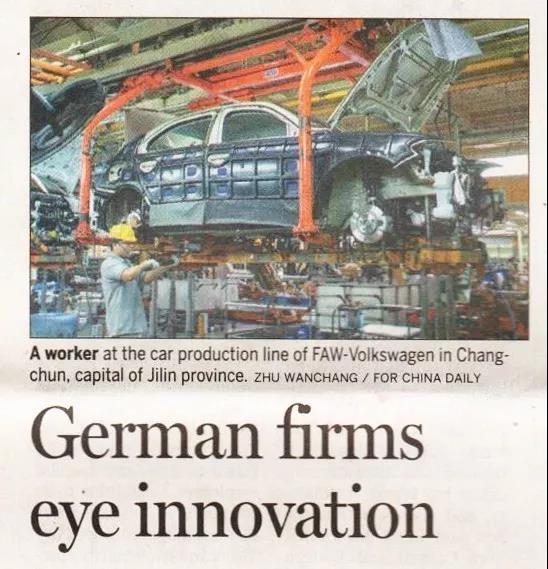
On October 25, 2017, Prof. Dr. Zheng HAN (韩政) at CDHK, Tongji University, and representatives of the German Chamber of Commerce in China | Shanghai and goetzpartners Management Consultants gave a press conference at the AHK Industrie 4.0 Forum, releasing a joint survey report on innovation of German businesses in China. The research provides valuable insights for academic and business communities alike, helping to decipher key challenges and opportunities of managing innovation in China`s economy under transformation.

To shed light on the innovation activities of German manufacturing companies in China, a comprehensive survey covering a range of topics such as innovation attitude, innovation skills and culture, and innovation collaboration was conducted among senior executives of such companies in Q1 2017.
The survey, with a regional focus on the Yangtze Delta area, generated 111 valid responses. The industries most represented are automotive and industrial equipment and the majority of surveyed companies are wholly-foreign owned enterprises.
The survey attracted interest of local and national media and was featured on the front page of China Daily's business section on October 27, 2017.


For the next three years, more than 80% of surveyed companies expect an increase in new product launches and revenue contribution from new products. Along with this, the majority of respondents finds innovation important for company growth and names it among top 3 business priorities.Taking a closer look, the main reasons to engage in innovation are of market-oriented nature: to meet customer needs, to differentiate from competitors and to attract new customers.

Human resources, in particular an unsatisfactory level of employees' innovation skills such as critical thinking and complex problem solving, were identified as the most significant barrier to innovation. Other key barriers include IP concerns and headquarter influence. With respect to the latter, the survey data indicates a significant positive correlation between subsidiary autonomy from headquarters and innovation performance. Surprisingly, although most companies identified innovation as important to protect and enhance their market success in China, only a minority (41%) has a well-defined innovation strategy.

Analysing the survey results led to the identification of a group of companies that perform particularly well in their innovation activities. Looking at what those ‘Top innovators’ (top 15%) do differently than their less innovative peers, the following ‘innovation success factors’ could be derived: having a clear innovation strategy, fostering continuous learning and development, encouraging fresh ideas, accepting failures, collaborating with external partners, and thinking locally.

The survey results suggest a number of game-changing shifts in companies’ innovation behaviour. While today most companies still limit their R&D activities to ‘global-to-local’ and ‘local-to-local’ innovation, ‘local-to-global’ innovation will become of increased strategic importance. In addition, a shift from product to business model innovation is likely to take place. The collaboration with non-supply chain partners such as start-ups and competitors will become of increased importance in companies’ innovation activities. Industrie 4.0, although expected to have impact on future business success across industries, is still met with uncertainty.
To truly flourish, companies in China will need to work on their internal innovation approaches to compensate structural shortages in the macro ecosystem.


